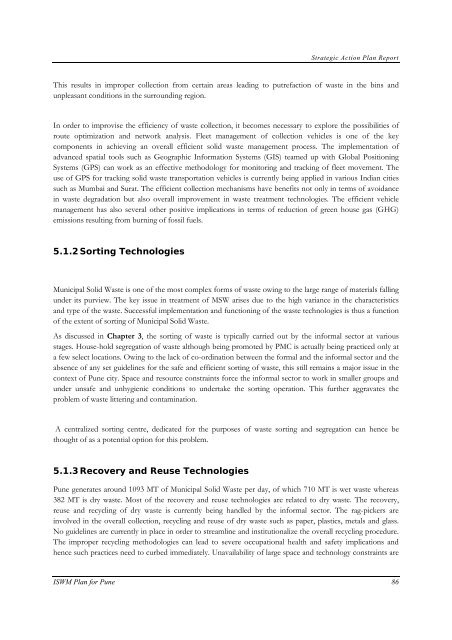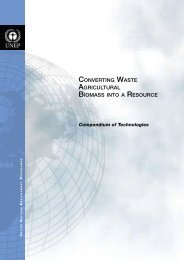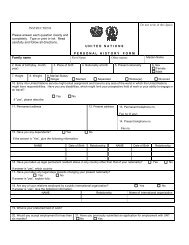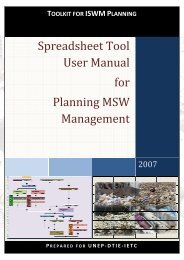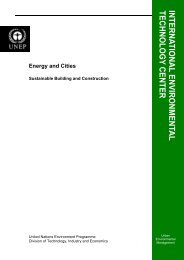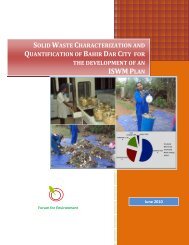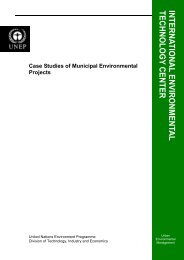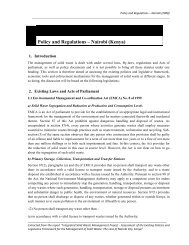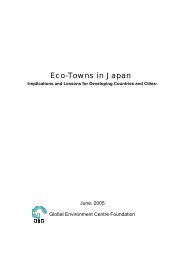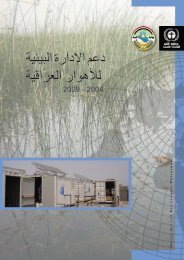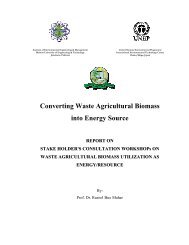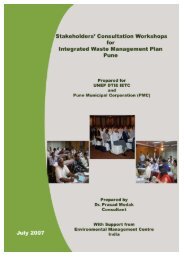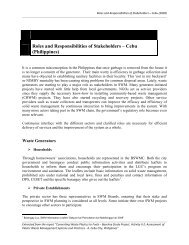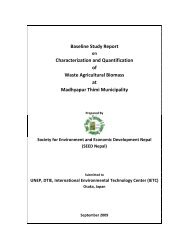Strategic Action Plan - International Environmental Technology Centre
Strategic Action Plan - International Environmental Technology Centre
Strategic Action Plan - International Environmental Technology Centre
You also want an ePaper? Increase the reach of your titles
YUMPU automatically turns print PDFs into web optimized ePapers that Google loves.
<strong>Strategic</strong> <strong>Action</strong> <strong>Plan</strong> Report<br />
This results in improper collection from certain areas leading to putrefaction of waste in the bins and<br />
unpleasant conditions in the surrounding region.<br />
In order to improvise the efficiency of waste collection, it becomes necessary to explore the possibilities of<br />
route optimization and network analysis. Fleet management of collection vehicles is one of the key<br />
components in achieving an overall efficient solid waste management process. The implementation of<br />
advanced spatial tools such as Geographic Information Systems (GIS) teamed up with Global Positioning<br />
Systems (GPS) can work as an effective methodology for monitoring and tracking of fleet movement. The<br />
use of GPS for tracking solid waste transportation vehicles is currently being applied in various Indian cities<br />
such as Mumbai and Surat. The efficient collection mechanisms have benefits not only in terms of avoidance<br />
in waste degradation but also overall improvement in waste treatment technologies. The efficient vehicle<br />
management has also several other positive implications in terms of reduction of green house gas (GHG)<br />
emissions resulting from burning of fossil fuels.<br />
5.1.2 Sorting Technologies<br />
Municipal Solid Waste is one of the most complex forms of waste owing to the large range of materials falling<br />
under its purview. The key issue in treatment of MSW arises due to the high variance in the characteristics<br />
and type of the waste. Successful implementation and functioning of the waste technologies is thus a function<br />
of the extent of sorting of Municipal Solid Waste.<br />
As discussed in Chapter 3, the sorting of waste is typically carried out by the informal sector at various<br />
stages. House-hold segregation of waste although being promoted by PMC is actually being practiced only at<br />
a few select locations. Owing to the lack of co-ordination between the formal and the informal sector and the<br />
absence of any set guidelines for the safe and efficient sorting of waste, this still remains a major issue in the<br />
context of Pune city. Space and resource constraints force the informal sector to work in smaller groups and<br />
under unsafe and unhygienic conditions to undertake the sorting operation. This further aggravates the<br />
problem of waste littering and contamination.<br />
A centralized sorting centre, dedicated for the purposes of waste sorting and segregation can hence be<br />
thought of as a potential option for this problem.<br />
5.1.3 Recovery and Reuse Technologies<br />
Pune generates around 1093 MT of Municipal Solid Waste per day, of which 710 MT is wet waste whereas<br />
382 MT is dry waste. Most of the recovery and reuse technologies are related to dry waste. The recovery,<br />
reuse and recycling of dry waste is currently being handled by the informal sector. The rag-pickers are<br />
involved in the overall collection, recycling and reuse of dry waste such as paper, plastics, metals and glass.<br />
No guidelines are currently in place in order to streamline and institutionalize the overall recycling procedure.<br />
The improper recycling methodologies can lead to severe occupational health and safety implications and<br />
hence such practices need to curbed immediately. Unavailability of large space and technology constraints are<br />
ISWM <strong>Plan</strong> for Pune 86


